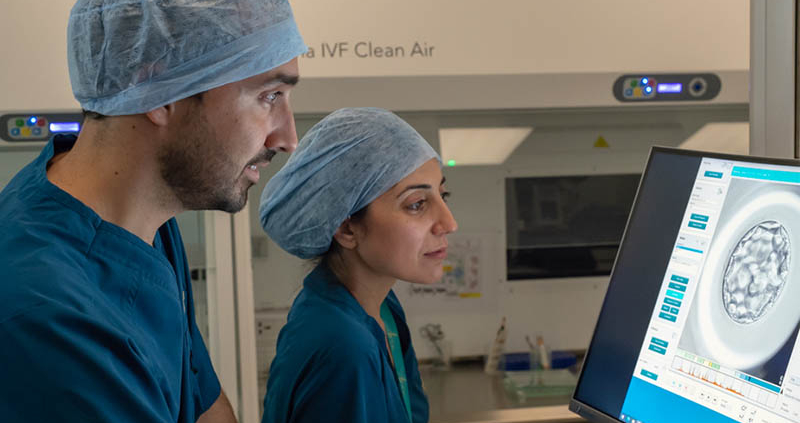Aria Fertility launch ‘game changer’ study into non-invasive approaches to improve chances of conception
Globally, we are starting families later than ever. Although most couples do get pregnant within the first 12 months of trying, it is estimated that one in seven couples may have difficulty conceiving.
Though the latest data from the Human Fertilisation and Embryology Authority (HFEA) reveals that the rate of successful IVF treatments continues to rise, it also noted that the chance of having a baby after one treatment cycle for women under 35 years of age is 31.3%.
Fertility clinics are increasingly focusing on the biopsychosocial dimension of fertility and, using a unique and cutting-edge approach, Aria’s Laboratories are conducting an innovative study to investigate how non-invasive data could be used to tailor and maximise IVF treatments.
Mr Stuart Lavery, Consultant Gynaecologist and a Founding Director of Aria Fertility, explains: “Aria Fertility was born through the vision of leading clinicians and embryologists who have combined their experience and vision to deliver truly market-leading fertility care, whilst combining the latest technological advances and pioneering research in the field of embryology.
“Using a unique and cutting-edge approach, Aria’s Laboratories are conducting an innovative study to investigate how non-invasive data could be used to tailor and maximise IVF treatments.”
The Safe Assessment of Embryos (SAFE) study aims to integrate information on individual’s sleep quality, lifestyle habits, laboratory and clinical data, together with non-invasive genetic information and the most advanced algorithms for embryo selection using artificial intelligence (AI).
Embryo selection explained
Once embryos are created in in vitro, embryo selection is a decisive stage in IVF treatment. The healthier the embryo selected, the higher the chance of a successful pregnancy result.
There are several methods embryologists use to select for the best embryo. One method used in routine practice involves looking at the appearance of the cells which make up the embryo (morphological assessment). Another method involves tracking the growth of the embryo in a special incubator that records images over time (morpho-kinetic assessment).
One emerging method to score embryos involves AI, which can be used to rank the embryos most likely to become a baby. Even though all methods are valid, there are currently discrepancies between IVF laboratories when it comes to their criteria, use and implementation.
Currently, genetic data from the embryo is obtained through a biopsy of the embryo, where some cells are removed and sent for analysis. Although being invasive, preimplantation genetic testing of aneuploidies (PGT-A, formerly known as PGS) is considered the gold standard technique to check embryos for abnormalities in the number of chromosomes – key factor for successful pregnancy.
Chief Investigator and Laboratory Manager at Aria, Xavier Viñals Gonzalez explains why the SAFE study is unique. “The SAFE study proposes to use the culture medium, which is the nutrient fluid that embryos are placed in to grow, to gain genetic information in a non-invasive manner. Embryos gain their nutrients from the culture medium to grow, and they then secrete certain markers into the medium. Previous studies have connected these with embryo’s genetic makeup.
“In routine treatment, the culture medium is discarded after the embryos have been transferred or cryopreserved. Our laboratory will measure these markers in the medium to see whether they are predictive of a live birth.”
Sleep and fertility
Previous studies have shown that sleep quality and length to be associated with variations in fertility hormones, number of eggs collected during fertility treatment, egg maturation, and quality of semen.
Dr Sara McNeillis, Sleep Medicine and Anaesthesia Consultant, joins Aria’s study to investigate the vastly unexplored area of sleep disorders and infertility. With the aid of a smart watch, individuals sleep quality and patterns will be measured and further complemented with sleep questionnaires. Also, participants will be encouraged to record information on lifestyle habits while they are enrolled in the study.
Joining the fertility study
To be eligible to participate in this study, individuals must be between the ages of 18 and 44 and planning to have IVF with a single embryo transfer. Given its non-invasive nature, being part of the SAFE study will not impact individual’s treatment in any way. Results from this research could be the biggest game changer not only for how we analyse data to predict successful outcomes in IVF but also for patients to understand their options during their reproductive journey.
To find out more about our study and the work of the Aria embryologists, call us on +44 (0) 203 263 6025 to speak to one of the team.

